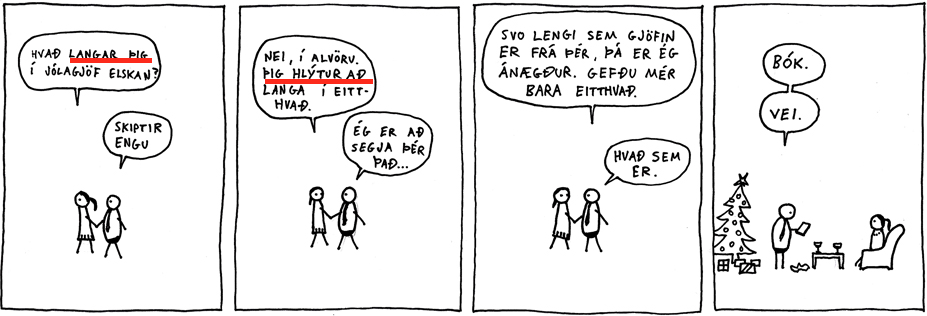Let’s Get Up Close And Personal With Impersonal Verbs Posted by Meg on Mar 20, 2017 in Icelandic grammar
Impersonal verbs are not unique to Icelandic (e.g., German “mir ist kalt” [to me it is cold] rather than “ich bin kalt” [I am cold]), but they are perhaps comparatively common. Impersonal in this case means that the subject of the sentence is the recipient of the action, instead of the do-er. The predicate is often in the nominative case, which makes it appear to be the grammatical subject (most commonly, an implied “it”). It can be hard to wrap your mind around a sentence in which you, the speaker, aren’t the do-er, but it’s by no means impossible.
Fortunately, though there are manifold impersonal verbs in Icelandic, there are a few very commonly used ones that are easy to remember. The keys to the kingdom are:
- the subject is in accusative or dative. Which means that the subject isn’t the do-er, but the receiver or the perceiver.
- you don’t decline the verb as you would normally (e.g., ég tala, þú talar, við tölum) because the verb is always in the third person
- the predicate is either in nominative case or accusative case. If the subject is in the accusative case, then the predicate is in accusative case. If dative, then it’ll have a nominative predicate.
- Impersonal verbs in Icelandic are usually used to express ideas, feelings, and mental/emotional states…and food-related stuff, like hunger and thirst.
So lets take a look at verbs in which the subject is in the accusative case:
- Dreyma: to dream
- Mig dreymdi skrýtinn draum í nótt
- Mig dreymir oft skrýtnir draumar
- Gruna (suspect)
- Mig grunar
- Langa/langa í (to want)
- Mig langar að eiga þúsund líf (I want to have a thousand lives)
- Vanta (to need; something is lacking)
- Mig vantar pening (I need money)
- Minna
- Hana minnir að ég tala íslensku (She remembers I speak Icelandic)
- Þig minnir að skrifa ritgerðina. (You remember to write the essay)
- Svengja (be hungry)
- Egil svengir
- Þyrsta (be thirsty)
- Ástu þyrstir
- Mig þyrstir í ævintýri (I thirst for adventure!)
- Svima (get dizzy)
- Mig svimar
… if something makes you dizzy, then “Mig svimar af tilhugsuninni” (I’m dizzy from thoughts/ideas. “Tilhugsun” is in the dative case here because “af” takes over and controls the case in place of the verb, and af is always dative).
- Mig svimar
- Syfja (get sleepy)
- Mig syfjar.
- Verkja (feel pain)
- Mig verkjar í fótinn (my foot hurts)
Impersonal verbs that take the dative case: (so predicate is in nominative, but subject is in dative unless another verb or preposition comes into play)
- Bregða (be startled, be shocked)
- Mömmu mína brá þegar hún tók eftir nýju hárgreiðsluna mína (Mom was shocked when she noticed my new haircut)
- Finnast (to find something, to opine, to think)
- Mér finnst bókin leiðinleg (I found the book boring)
- Leiðast (be bored)
- Mér leiðast (I’m bored)
- Líka (to like)
- Honum líkar vel hérna (He likes it a lot here)
- Seinka (to be late, delayed)
- Flugvélinni seinkar um tvo tíma (the plane was 2 hours late)
- Sýnast (to seem to be)
- Mér sýnast þetta vera fugl (It seems to me to be a bird)
- Mér sýnast þetta ganga vel (It seems to me to be going well)
- Takast (to succeed)
- Mér tókst ekki að klára bókina
- Mér tókst að ná prófinu (I passed the test!)
- Virðast (to seem to be)
- Það virðist vera draugur (There seems to be a ghost!/It appears to be a ghost! )
- Þykja (to find)
- This verb is a bit distinctive. The verb in this case can be either 3rd person singular (þykir) or 3rd person plural (þykja). That depends on what follows in the predicate.
- I’ve read/been told (see here https://bland.is/umraeda/ad-elska-eda-ad-thykja-vaent-um-thad-er-vandinn-/6920285/) that the phrase “ég elska þig” – which is in common usage – is an Englishism.
- The older phrase, and perhaps “more Icelandic” is to say Mér þykir vænt um þig. (or, if you’re talking about your ex, mér þótti vænt um hana/hann).
- Of course, you can þykir vel um something, or skrítinn or góður or ljótur.
- Mér þykja (3.p.plural.) ávextir góðir. – I think fruit is good. Fruit is in the plural, so þykja is in the plural. If you thought the (singular) fruit was good, you’d say mér þykir ávöxturinn góður.
There are a few other verbs that are both impersonal and personal. They’re impersonal when they denote a condition – a bodily condition – and personal when a thing, not a person, is in a particular condition/state, is doing something, or changing in some way. So your disposition (ástand) can improve, but you yourself cannot.
- batna (to recover): Mér batnar fljótt vs. Ástandið batnar
- hitna (to get warm): Mér hitnar vs. Ofninn hitnar ekki
- kólna (to get cold): Mér kólnar vs. Maturinn kólnar
- versna (to get worse): Mér versnaði veikin vs. Veðrið versnaði
- líða (to feel, to be): Mér líður vel vs. Tíminn líður hratt
- vera kalt (to be cold): Mér er kalt vs. Maturinn er kaldur
- vera heitt (to be warm): Mér er heitt vs. Ofninn er heitur
List of impersonal verbs:
http://gogn.ma.is/kenn/svp/kennsluefni/malfar/oper.htm
Questions, comments? Drop me a comment.
Best,
M

Build vocabulary, practice pronunciation, and more with Transparent Language Online. Available anytime, anywhere, on any device.





Comments:
Helen:
Very useful. Thank you!